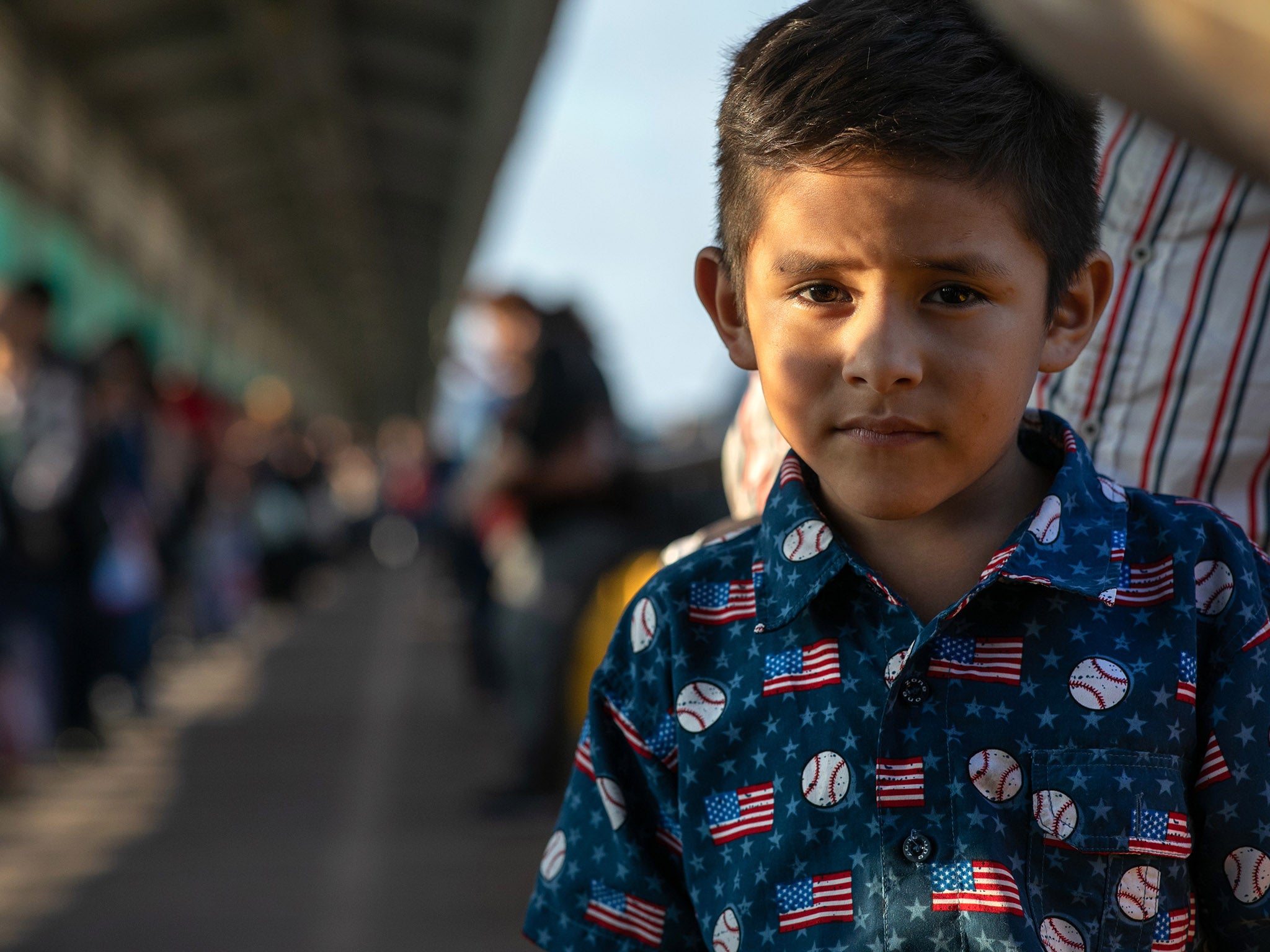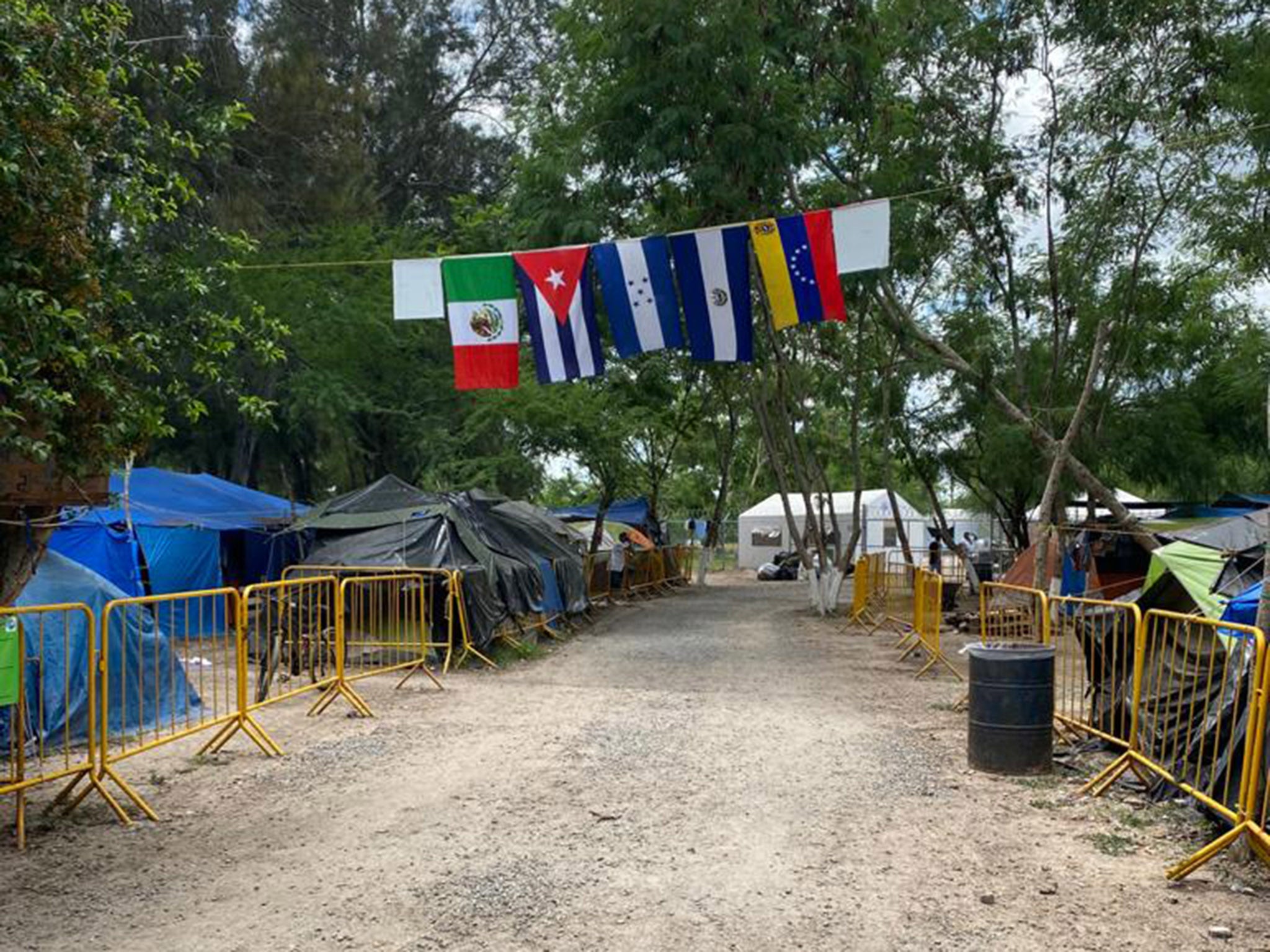Asylum seekers forced to remain in Mexico under Trump policy say Biden is their last hope
Forced from their homes by gangs and violence, families travel thousands of miles to Mexico only to suffer the same fate in refugee camps. Chantal da Silva talks to them


When 17-year-old Ronal Morales and his family first embarked on the treacherous journey to the US border in July 2019, leaving the lives they had built in El Salvador behind, they never imagined that their destination might be just as unforgiving as the circumstances they had fled.
Back in El Salvador, Morales, whose last name has been changed over fears of retribution for speaking out, had been facing growing pressure to join one of the gangs that dominated his city.
For years, he had tried to avoid them, but one day, while walking home from school, he was confronted by four gang members who gave him two choices: “They told me to join them. If not...they were going to kill me.”
"Gangs dominate a large part of El Salvador," Morales explained, with two rival gangs, Mara Salvatrucha, also known as MS-13, and 18th Street, responsible for widespread extortion, violence and murder across the country.
"The gangs dominate more than the police do and even the police...are complicit with them,” the 17-year-old said.
When Morales told his mother and sister, who turns 19 next month, about the gang’s threat, they did not even consider the possibility of turning to the authorities. If they tried to file a report, they knew the gang would quickly find out and then, the whole family might be targeted.
“I could no longer live in peace. I was afraid to even go to school because they walked the streets,” Morales said. “And that is why my mother, my sister and I had to leave El Salvador.”
The journey to the US border was an arduous one, with the family making their way through Central America only to be stopped in Mexico and detained for weeks before being deported back to El Salvador. Fearing what might happen to Morales if they stayed, they fled their home a second time the very next day.
When they finally reached US soil in late August, after crossing the Rio Grande river, which runs along the US-Mexico border, they were quickly stopped by border patrol agents and told they would have to wait in Mexico while their asylum claims were processed under a new programme introduced at the start of the year: the Migrant Protection Protocols (MPP).
Colloquially known as the “Remain in Mexico” policy, the MPP programme has seen tens of thousands of asylum seekers forced to wait in Mexican border towns while their asylum claims are considered in the US. Many have been forced to wait for months, if not for more than a year, despite repeated warnings from human rights groups of the dangers they face in border towns affected by high rates of violence and crime.
Morales and his family ended up in Matamoros, a border town in Tamaulipas State with a level 4 “do not travel” advisory from the State Department – the same travel warning the US assigns to most conflict zones due to high rates of “crime and kidnapping”.
Now, more than a year later, the Morales family is still waiting at the Matamoros camp, where, for more than 400 nights, they have had to sleep under tarps in the midst of poisonous snakes, rats and mosquitos, while surviving extreme heat, tropical storms and flooding, as well as the constant threat of violence from criminal groups operating in the area.
Hundreds of reports from asylum seekers in the MPP programme say they have faced extortion, physical or sexual violence and torture while waiting for their asylum claims to be considered
That threat is a real one, with Human Rights Watch (HRW) documenting hundreds of reports from asylum seekers in the MPP programme who say they have faced extortion, physical or sexual violence and torture while waiting for their asylum claims to be considered in the US.
In Tamaulipas, at least 80 asylum seekers in the MPP programme were reported to have been targeted in kidnappings or attempted kidnappings between November 2019 and January 2020. Nearly half of those targeted were children and at least four women said they were sexually assaulted by their assailants.
In the midst of the coronavirus pandemic, asylum seekers also face an additional threat, with at least 90 people at the camp having so far contracted coronavirus, according to Andrea Leiner, the strategic operations director of Global Response Management (GRM), an organisation providing medical aid and support to asylum seekers.
Yet, she noted, rather than extending support to asylum seekers forced to remain in Mexico, the US has further sealed its borders shut, bringing the asylum system to a temporary halt. Now, it could be several more months, if not longer, before the Morales family’s cases are even considered, along with those of thousands of others.
With little hope left, there is one straw that Morales and other asylum seekers at the Matamoros camp clutch on to: 3 November, the day that Democratic presidential candidate Joe Biden might be elected into office, bringing Donald Trump’s time in power, as well as the MPP programme, to an
If elected, Biden has vowed to see Trump’s hardline immigration policies rescinded, starting with the reversal of the president’s Migrant Protection Protocols within his first 100 days in office.
“I dare say that everyone in the camp wants Biden to win,” Morales said. “If everything he promises is true and he will fulfil it, then it is best for us if he wins.”
The looming US election, says Andrea Leiner, has weighed heavily on many at the camp. “It’s definitely on people’s minds. I don’t think there’s a huge amount of belief that things are going to change, but this is the last glimmer of hope people are holding on to.”
Many who have been at the camp for months now still remember a visit in December 2019 from Jill Biden, the Democratic presidential nominee’s wife. Her visit to the camp had drawn fresh attention to the plight of the asylum seekers there. However, in recent months, Leiner said, much of that spotlight has fallen away.
“Even six months ago, the situation at the border was getting a lot of attention, but now it’s drowned out by all the news that’s going on domestically and abroad. So, all across the border, [asylum seekers] are just feeling forgotten,” Leiner said. “They feel like they have nowhere to go, no path forward, but there’s definitely no going home.”
“With Biden, if he reversed MPP . . . that’s the kind of thing to hold onto, that perhaps there’s a way through Biden.”

That is certainly the hope of Carlos Garcia, a 47-year-old father from El Salvador who fled to the US border with his wife and two young children after facing threats of violence.
At first, Garcia, whose last name has been changed over fears of persecution, said it was his brother-in-law that was being targeted by gang members back home.
However, after his brother-in-law fled to the US, where he successfully gained asylum, the gangs soon turned their attention to Garcia’s own family, demanding that they pay the equivalent of $500 (£386) each month in “protection” money. If they did not pay the fees, Garcia said, his family’s lives were at risk, with gang members starting to focus their threats on Garcia’s daughter, who was just 11 at the time.
This city is very dangerous. This is one of the most dangerous borders, like all of those in Tamaulipas
“They wanted us to pay $500 a month, but we could not pay. So, we had to leave our country and leave everything,” he said.
The day his family arrived at the Matamoros camp, on 6 August 2019, is one he will never forget. “It’s an unforgettable date. Because of so much fear,” he said. “This city is very dangerous. This is one of the most dangerous borders, like all of those in Tamaulipas,” he said.
“Here in Matamoros, we’ve had a lot of difficulties,” Garcia said. Not only is there the threat of potential violence from criminal groups in the area but, he said, when his family first arrived at the camp his son, who is eight, was so ill “that he almost died”.
While his son has physically recovered, Garcia worries about the psychological impact of being at the camp. His children have witnessed so many disturbing scenes in the time that they have been forced to remain at Matamoros.
“The crime in this place is so widespread and to such a degree that our children have seen how [criminal groups] hurt people in the middle of the day. They have seen corpses float by in the river,” he said. “All that creates psychological problems for our children and that is not easy to carry. It’s not easy.”
Leiner said GRM was aware of recent reports of bodies being seen floating down the Rio Grande, past the Matamoros encampment. Those killed were not asylum seekers from the Matamoros camp, she said.
However, in August, asylum seekers at the camp were left devastated when one young man, Edwin Rodrigo Castro de la Parra, who had been considered a leader in the community, was found drowned in the river.
For Leiner, the impacts of the Trump administration’s “Remain in Mexico” policy “has really just been an observation of just how much the human psyche and the human body can take.”
“It’s almost biblical – in between the plague, famine, flood, war and conflict – just how much people have had to face just to make it to this point,” she said.
“And for all these parents, their only hope is that their children will survive,” she said. “There is no thought of, ‘oh perhaps we can get them into a good college and maybe have them join a soccer team, and have a good life’. No, it’s just basic survival that they want for their children and that is pretty profound, when your life’s work is dedicated to just making sure that you and your children can survive.”
That is all Garcia wants for his family: survival. If Trump is re-elected and the “Remain in Mexico” policy remains in place, however, Garcia fears for his family’s future. “For us, it would be like when food is taken away from a hungry child and he is left with no way to defend himself or to get more food,” he said. “In other words, it would be very disastrous for us.”
“Trump does not want us there because, according to him, all Central Americans are bad,” Garcia said. “But, the bad guys in our country are doing harm to the Salvadoran people. We left our country because the bad guys forced us to leave our country. That’s what he doesn’t think about… or if he does think about it, then he doesn’t care.”
The Trump and Biden campaigns have been contacted for comment.



Join our commenting forum
Join thought-provoking conversations, follow other Independent readers and see their replies
Comments